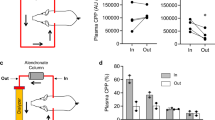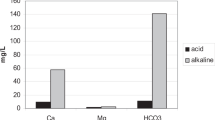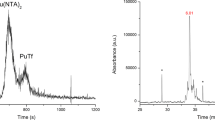Abstract
PLASMA ultrafiltrate is thought to contain polyphosphates which prevent the nucleation of calcium salts on collagen. Under physiological conditions, these substances are thought to be inactivated by alkaline phosphatase, and so do not interfere with nucleation in bone tissue. We have tested the efficiency of several polyphosphates in preventing the skeletal deposition of strontium-85 in experimental animals. In a series of experiments, groups of ten albino Sprague–Dawley rats (200 g) or ASL mice (20 g) were injected intraperitoneally with 1 µC. of strontium-85 free of carrier.
This is a preview of subscription content, access via your institution
Access options
Subscribe to this journal
Receive 51 print issues and online access
$199.00 per year
only $3.90 per issue
Buy this article
- Purchase on Springer Link
- Instant access to full article PDF
Prices may be subject to local taxes which are calculated during checkout
Similar content being viewed by others
References
Fleish, H., and Neuman, W. F., Amer. J. Physiol., 200, 1296 (1961).
Author information
Authors and Affiliations
Rights and permissions
About this article
Cite this article
BATES, T., SMITH, H. Influence of Polyphosphates on Retention of Radioactive Strontium in Rat and Mouse. Nature 212, 925–926 (1966). https://doi.org/10.1038/212925b0
Issue Date:
DOI: https://doi.org/10.1038/212925b0
Comments
By submitting a comment you agree to abide by our Terms and Community Guidelines. If you find something abusive or that does not comply with our terms or guidelines please flag it as inappropriate.



